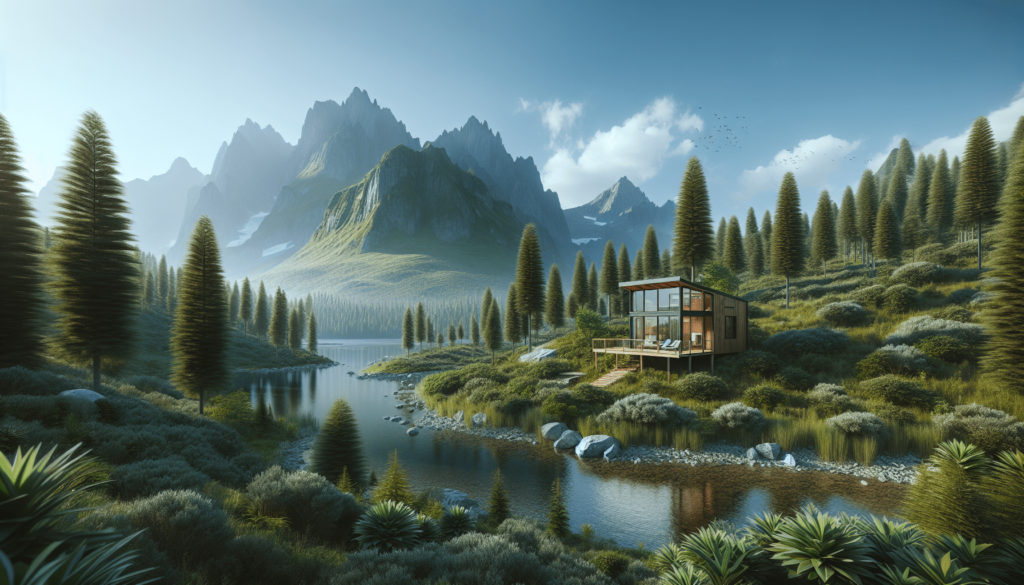
Embarking on a journey to live off the grid can be both exciting and rewarding, and choosing the right state is crucial for your success. “What Is The Best State For Off-grid Living?” dives into the top considerations and options to find the ideal location that fits your vision of a self-sufficient lifestyle. From climate and natural resources to legal regulations and community support, this article provides a comprehensive overview to help you make an informed decision. Discover where you can best cultivate your dream of living independently and sustainably amidst the beauty and challenges of nature. Have you ever dreamed of leaving behind the hustle and bustle of modern life to live off the land, completely self-sufficient and surrounded by nature? Off-grid living offers a compelling escape from the fast pace and constant connectivity that defines our everyday lives. But where, you might ask, is the best place to make this dream a reality?
The United States is vast and diverse, offering a variety of climates, landscapes, and levels of accessibility that can either help or hinder your off-grid adventure. This article will delve into some of the best states for off-grid living, helping you to decide which location might be the perfect fit for your new eco-friendly, self-sustaining life.

What Is Off-Grid Living?
Before diving into the best states for off-grid living, it’s crucial to understand what it entails. Off-grid living means living without reliance on public utilities. This includes generating your own electricity, sourcing your own water, and even growing your own food. Off-grid living can vary greatly depending on the individual’s needs and desires—from a minimalist cabin deep in the woods to a fully equipped eco-home with all modern amenities.
Key Features of Off-Grid Living
- Electricity: Solar panels, wind turbines, or hydroelectric power.
- Water: Wells, rainwater collection, or nearby natural water sources.
- Food: Vegetable gardens, livestock, and foraging.
- Waste Management: Composting toilets and recycling.
Criteria for Evaluating the Best States for Off-Grid Living
Choosing the best state for off-grid living isn’t as simple as pinpointing a spot on the map. Several factors come into play, each influencing your ability to live self-sufficiently and sustainably.
Climate
The climate is perhaps the most significant factor to consider. A favorable climate will ensure you can grow your own food, harness solar or wind energy efficiently, and live comfortably throughout the year.
Land Affordability
Purchasing land is a significant upfront cost, and prices can vary dramatically from state to state. Affordable land makes it easier to start your off-grid journey without breaking the bank.
Natural Resources
Access to natural resources such as water, timber, and fertile soil is essential. These resources will support your self-sustaining lifestyle.
Regulations
Some states have stringent regulations regarding building codes, water rights, and energy production. You’ll want to select a state with less restrictive laws pertaining to off-grid living.
Community
While off-grid living can be a solitary endeavor, having a supportive community of like-minded individuals can provide valuable support and resources.
Top States for Off-Grid Living
1. Alaska
Alaska might just be the ultimate state for off-grid living. Vast, sparsely populated, and brimming with natural resources, Alaska offers ample opportunities for a self-sufficient lifestyle.
| Factor | Description |
|---|---|
| Climate | Harsh winters, cool summers. Suitability depends on your tolerance for cold. |
| Land Affordability | Land is relatively cheap but requires substantial groundwork for habitation. |
| Natural Resources | Abundant fishing, hunting, and timber. Water sources are plentiful. |
| Regulations | Minimal regulations but can be stringent in some areas. |
| Community | Off-grid communities exist but tend to be isolated. |
2. Montana
Montana, the “Big Sky State”, boasts arid landscapes, mountains, and a variety of natural resources that make it an excellent choice for off-grid living.
| Factor | Description |
|---|---|
| Climate | Diverse climate with cold winters and warm summers. |
| Land Affordability | Land is moderately priced, especially in more remote areas. |
| Natural Resources | Plenty of water sources, rich soil, and timber. |
| Regulations | Fairly lenient, especially in rural areas. |
| Community | Growing number of off-grid communities and sustainable farms. |
3. Vermont
Vermont is well-known for its picturesque landscapes and progressive attitudes towards sustainability and eco-friendly living.
| Factor | Description |
|---|---|
| Climate | Four distinct seasons with cold winters and warm summers. |
| Land Affordability | Land is on the pricier side but offers significant value. |
| Natural Resources | Fertile soil and abundant water sources. |
| Regulations | Generally supportive laws for off-grid living, but malpractices may be penalized. |
| Community | Strong sense of community with a focus on sustainability. |
4. Tennessee
Tennessee offers a mild climate, affordable land, and a pleasantly relaxed regulatory environment, making it a standout choice for off-grid living.
| Factor | Description |
|---|---|
| Climate | Mild climate with hot summers and mild winters. |
| Land Affordability | Extremely affordable land in rural areas. |
| Natural Resources | Plentiful water sources, fertile soil, and moderate timber. |
| Regulations | Lenient compared to many other states. |
| Community | Numerous off-grid and homesteading communities. |
5. Oregon
Oregon’s diverse landscape ranges from mountains to coastlines and offers a wealth of natural resources, making it an attractive option for off-grid living.
| Factor | Description |
|---|---|
| Climate | Varied, with coastal, temperate rainforest, and arid regions. |
| Land Affordability | Land prices vary widely depending on location. |
| Natural Resources | Abundant timber, fertile soil, and water sources. |
| Regulations | Moderate regulations, particularly in rural areas. |
| Community | Strong focus on sustainability and eco-friendly living. |
6. Texas
Texas may not be the first state that comes to mind, but its vast land, lenient regulations, and diverse climate zones make it a great contender.
| Factor | Description |
|---|---|
| Climate | Ranges from arid deserts to humid subtropics, providing options. |
| Land Affordability | Land is relatively affordable, especially in rural regions. |
| Natural Resources | Varied resources depending on the area, including water, timber, and grazing land. |
| Regulations | Lenient, with a preference for property rights and individual freedom. |
| Community | Homesteading and off-grid communities are emerging. |
7. North Carolina
North Carolina offers a balanced blend of favorable climate, natural resources, and community support—all beneficial for off-grid living.
| Factor | Description |
|---|---|
| Climate | Mild climate with four distinct seasons. |
| Land Affordability | Moderately priced land with varying terrains. |
| Natural Resources | Fertile soil, abundant water sources, and timber. |
| Regulations | Generally lenient in rural areas. |
| Community | Growing number of off-grid and sustainability-focused communities. |
Essential Tips for Off-Grid Living
Planning
Plan extensively before making the leap to off-grid living. Research your chosen location, budget your expenses, and anticipate potential challenges.
Permits and Regulations
Even in lenient states, you’ll likely need permits for building structures, water usage, and waste management. Make sure you understand the local regulations to avoid any legal hassles.
Renewable Energy
Invest in reliable renewable energy sources. Solar panels, wind turbines, and hydroelectric systems can provide the power you need, while also reducing your environmental footprint.
Self-Sufficiency
Build skills in farming, carpentry, and other essential trades. Being able to grow your own food, fix your own structures, and generally take care of yourself will be invaluable.
Community Networking
Even off the grid, having a network of like-minded individuals can be beneficial. Don’t isolate yourself completely—join local groups, share resources, and learn from others.
Emergency Preparedness
Living off-grid comes with risks, from natural disasters to medical emergencies. Make sure you have a plan in place for any situation that may arise.

Conclusion
Embarking on an off-grid lifestyle is an exciting but daunting endeavor. Choosing the right state is crucial to your long-term success and happiness. From Alaska’s vast wilderness to Tennessee’s mild climate, each state offers unique benefits and challenges. By understanding the key factors—climate, land affordability, natural resources, regulations, and community—you can make an informed decision that sets you up for a fulfilling off-grid life.
Remember, off-grid living requires thorough planning, adaptability, and a strong willingness to learn. But for those ready to embrace the challenge, the rewards are vast and deeply meaningful. Best of luck as you take the first steps towards your off-grid adventure!
